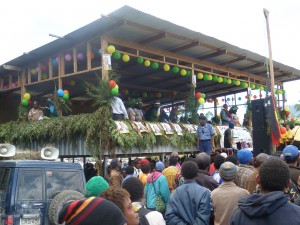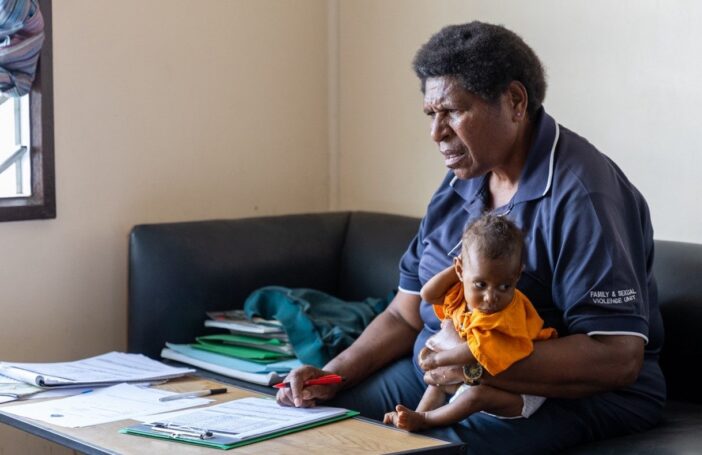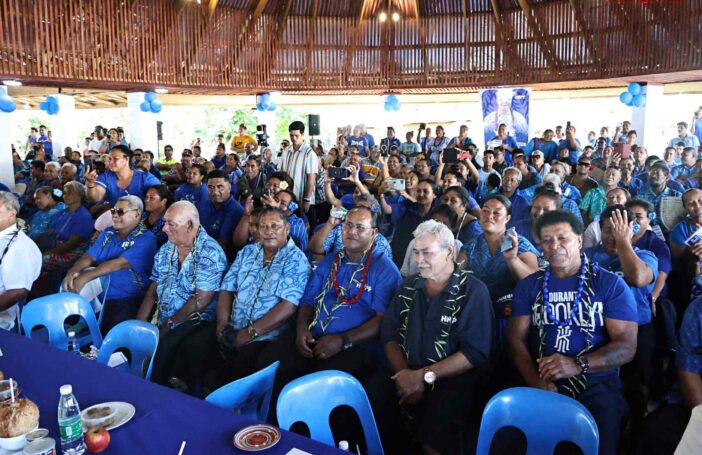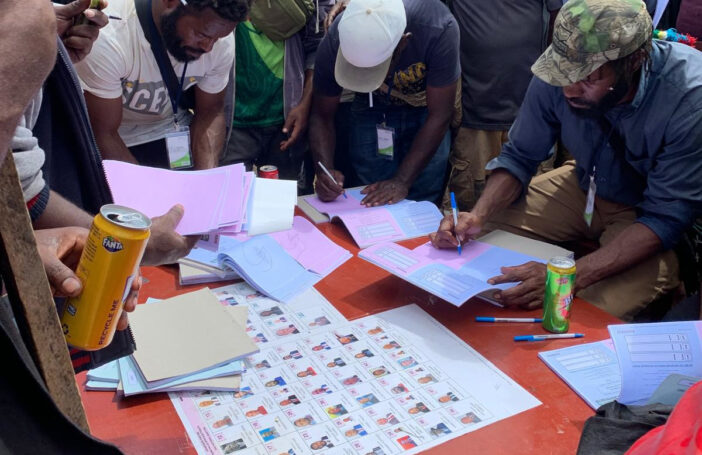PNG is coming to the end of a two-week national election which began on June 23rd. The formal campaigning period ended on June 22nd. Here I report on my week-long observation of the election campaign in its dying days in the Highlands of this colourful country.
I spent a week in Wabag, watching close range the height of campaigning for several seats in Enga province. The atmosphere was festive, the place peaceful, and the feisty spirit of the campaign at its peak.
Police and military officers were present in numbers both in Mount Hagan and Wabag. The ballot boxes were stored in steel containers inside a fenced compound next to the police station with the roads to the site blocked. Fully armed soldiers stood guard at the road block.
Campaign with cash, coke, and pork.
The campaign was all about mobilising cash, coca cola (coke), and meat (pork): this was pork barreling, literally. The lone redistribution that I witnessed involved the amassing of K17,000 (AU$8500) cash, 70 cartons of coke, 32 pigs, and 5 goats. These items alone that were redistributed that day amounted to a total of K71,000. Even I got K50 from the head of my clan from this redistribution.
Adding on costs of transport – all by 4-wheel drive vehicles, labour for the feast and accommodation for the participants, and logistics makes such rallies amount to K100,000 undertakings easily. Each candidate has several such rallies with each having just as many ‘Campaign Houses’.
Campaign houses are built throughout the electorate. Each Campaign house accommodates the supporters who are fed and housed throughout the campaign period. Vehicles, displaying pictures of the sponsoring candidate, speed along the dusty and rough Highland Highway transporting supporters to and from their homes to the campaign house.
The campaign is a mix of capitalism spiced with a heavy dose of the culture of exchange and reciprocity. Cash was handed to voters: Candidates paid anything between K500 to a K1,000 just to use a public platform to deliver a speech when away from their own campaign houses.
One candidate reported that K1 million was not enough; and, that winning was all about how much cash and cargo one could mobilise. Candidates were contesting to deliver cargo to their clans. This particular contender was adamant that the capacity to deliver services counted for nothing!
A rally to remember
Peter Ipitas, the governor of Enga, held a rally of his own in the provincial capital on the 20th of last month. It involved the handing over of a large building in town to a foundation named after the Governor that pays school fees of children in the province.
It was a rally to remember. While impossible to even hazard a count of the number present, the crowd filled the entire town. Police had a heavy presence. At least one officer was furiously waving a meter long whip as a means to freeing up space from the crowd of spectators for those in the procession.
The procession itself was a colourful and crowded affair. Children from the surrounding schools, students from the teachers college in Wabag, and many more joined a long and noisy march to a large platform constructed in town for the handing over ceremony. The governor was the guest of honour and many banners broadcasted and the banner holders chanted the good the governor had done.
Democracy at its pinnacle in PNG
 PNG may lack many things but not the festive and feisty fight for the 111 seats in the national parliament. Candidates spend millions of their own money and from their close kin to contest for seats which have a tenure of just 5 years and, if lucky, collect paychecks worth half as much. Why? How will the difference be patched?
PNG may lack many things but not the festive and feisty fight for the 111 seats in the national parliament. Candidates spend millions of their own money and from their close kin to contest for seats which have a tenure of just 5 years and, if lucky, collect paychecks worth half as much. Why? How will the difference be patched?
I was there to witness the drama and hear the drums of the last election campaign. The sheer sum of money spent during the campaigns is mind boggling. With dozens of candidates contesting each of the 111 seats, the money spent during the few weeks of the election campaign amounts to billions of Kina.
At what price I wonder. Basic services remain inaccessible to many. The Highlands Highway, the aorta of the PNG economy, is in a deplorable state.
Disappointingly, those elected will have little incentive to fix the broken-down infrastructure or work towards improving delivery of basic services in this land of rich natural resources.
If we are to see better leadership then the incentives for our politicians need to be remedied.
Pork and coke, in the meantime, have the day – cheers!
Satish Chand is Professor of Finance at the University of New South Wales and a Research Associate with the Development Policy Centre.





A good account of the PNG type of politics especially in the highlands of PNG.This to a lesser extent happens in the coastal areas of the country. In trying to understand PNG (highlands) politics, one has to have a better understanding of the culture of the people. PNG society is predominantly a communal society where everybody takes part and share the wealth (pigs, taro etc…). So the national election campaign is liken to the hosting of a village feast where the ‘big man’ shares his wealth amongst his people.
Thanks for your comments Jack. You are right about the ‘Big man’ politics in the Highlands. I was blown away by the amount of money poured in the campaigns.
We also need to be prepared for the fact that whilst the elections provide something of a circuit breaker, the upheaval since last August has had some really profound effects on the very fabric of constitutional democracy in PNG and there will be a number of fundamental issues to be resolved when the dust has settled
Tess, I agree that the compromises made across the three arms of government in the lead up to elections have done series damage to constitutional democracy in PNG. So it is all the more important that the ongoing national elections deliver the leaders willing and able to remedy the damage done by some of their predecessors.
A fascinating and entertaining account, Satish.
I don’t know if this is occurring in other parts of the developing world, but it at least some parts of the Pacific election day seems to have become an occasion to throw a big, island-wide party. In the northern Pacific these festive scenes can also be witnessed on election day, albeit not as extreme as what you’ve described in PNG.
In reference to incentives, some aspiring and incumbent candidates are definitely running for all the right reasons. But as PNG’s national pot gets bigger by the year, raising the stakes for the political class, many are probably also incentivized to gain power for other reasons. Let’s hope the former lot outnumbers the latter.
I’ll never forget this line, told to me by a gentleman working in PNG Finance: “We’re about to be hit by a tsunami of money. But is our house in order?”
Let’s hope these elections will usher in enough good leaders to get the house in order!
Thanks Ben. I agree that some candidates are vying for the seats for all the right reaons. As to whther they will win is a different matter. Like you, I am hoping for the best but we must be prepared for the worst!